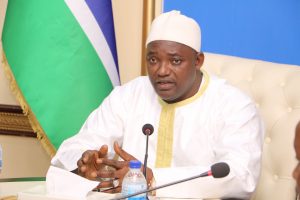 Heads of the Gambia’s Ministries of Agriculture, Fisheries and the Environment Wedsday briefed President Adama Barrow on activities related to the implementation of the National Development Plan (NDP) 2018-2021.
Heads of the Gambia’s Ministries of Agriculture, Fisheries and the Environment Wedsday briefed President Adama Barrow on activities related to the implementation of the National Development Plan (NDP) 2018-2021.
In its briefing, the Ministry of Agriculture reported that it has completed the review of its ten year policy for the period 2017-2026, launched a National Investment Plan (GNAIP) and the revitalization of its database. For the period under review, Japan and China have support for the Agriculture sector.
The Ministry also reported on its tidal irrigation projects and the strategies to add value to local products. It was also reported that negotiations are on for mechanization of agriculture as well as engaging the Gambian Diaspora to invest in commercial agriculture and empowering the youth through agriculture. It was also reported that the ministry of Agriculture engaged stakeholders to improve on poultry farming and food hygiene as well as provided seeds to farmers.
The Ministry of Fisheries, Water Resources and National Assembly Matters reported that its policies were revised, and has realized an increase in the fish resources. Twenty-five communities have been provided with solar powered water systems, twenty youths trained on aquaculture and women were also trained on improved techniques in fish processes. The ice plants in Gunjur and Tanje have been repaired and it has a refrigerated truck to reduce post-harvest lost in the fishing industry. Fisheries reported that between January and March this year it generated 50 million Dalasi paid to the Ministry of Finance. It also supplies fish to prisons, hospitals and the Army. It also generated support from FAO, AfDB, World Bank, and Saudi.
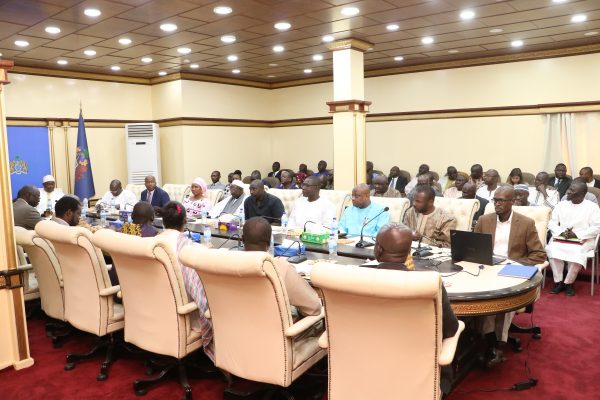 The Ministry of Environment and Forestry reported that it has completed a strategic plan; the forestry Act 2018 has been enacted and in partnership with agriculture developed the Agriculture and Natural Resource Policy. It also reported on projects to develop community forest parks, biodiversity, and on environment threats in the coastline areas.
The Ministry of Environment and Forestry reported that it has completed a strategic plan; the forestry Act 2018 has been enacted and in partnership with agriculture developed the Agriculture and Natural Resource Policy. It also reported on projects to develop community forest parks, biodiversity, and on environment threats in the coastline areas.
It has intercepted a container loaded with plastic bags to enforce the ban on plastic bags. A strategy for biodiversity to encourage women into bio-entrepreneurship was also shared. The Environment Ministry clarified that it is the municipalities that are responsible for waste collection. It however shared strategies being employed in the management of waste at the Bakoteh dumpsite.
Another presentation was on the OMVG energy project and the Sambangalo dam. The President was briefed on the state of the energy project and its plan to provide electricity in rural Gambia. President Barrow is the current chairman of the OMVG and its members are The Gambia, La Guinea, Senegal and Guinea Bissau.
For his part, President Adama Barrow thanked the sectors for their briefings and reiterated the need to align their activities towards the realization of the national plan. Commenting on the presentation, President Barrow cautioned that attention should be given to the impact of climate change on agriculture and food security.
He advised the ministries to look for alternative innovations and urged people to take advantage of the land and water resources. The President emphasised that the country should also take advantage of its youthful population to partner with stakeholders for resource mobilisation and knowledge transfer. President Barrow called on Gambians to actively engage in the fishing industry whilst adding that he was impressed with the transparency the Fisheries Ministry demonstrated in eliminating the cash payment system and cited similar best practice in Rwanda. The Gambian leader called on all to support and collaborate to succeed with the NDP.

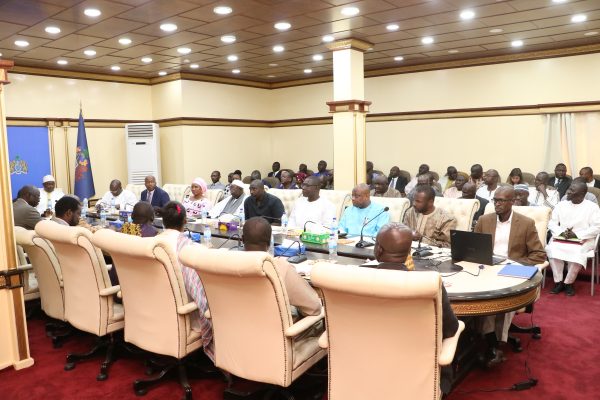
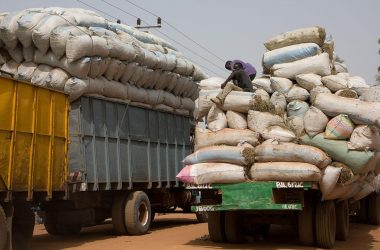
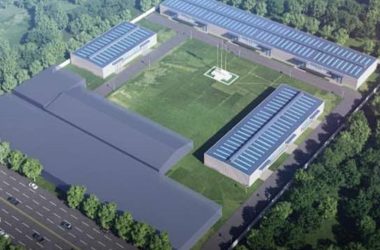
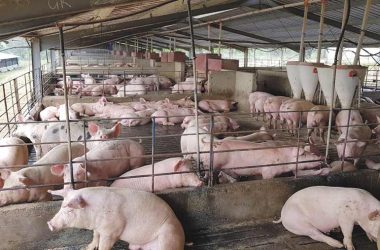

“The Ministry also reported on its tidal irrigation projects and the strategies to add value to local products. It was also reported that negotiations are on for mechanization of agriculture as well as engaging the Gambian Diaspora to invest in commercial agriculture and empowering the youth through agriculture. It was also reported that the ministry of Agriculture engaged stakeholders to improve on poultry farming and food hygiene as well as provided seeds to farmers”.
If this was all that the Ministry of Agriculture had to report in a briefing with the President, there’s ample reason for disappointment here.
It’s important to lay strategies out in detail, a snapshot as it were, showing exactly what specific strategies are in place and how private operators can benefit from such strategies.
On the subject of ” engaging the Gambian Diaspora to invest in commercial agriculture and empowering the youth through agriculture”, I was in attendance at a US Forum attended by the Minister of Agriculture, the Director of Planning (Projects) and members of the “American Chamber Gambia” (AmCham-Gambia).
The Minister’s presentation was at best lackluster and filled with anecdotes that didn’t help fill the audience’s demands for tangible data. What should have been described as a Matching Grant Incentive program, the Minister kept peddling as “Free Money”.
The Director of Planning, Mr Mbaye Jabang was asked to shed light on current Agricultural Export Data that could serve as pointers for potential investors. Data that one would sensibly assume that he would have been armed with to share with potential investors in Gambian agriculture. The gentleman clearly admitted that he didn’t have any data to share with the audience and instead went on and on to lay blame on the APRC administration for the dearth of agricultural data in The Gambia. The gentleman clearly was ill prepared for this trip in his role as the project adviser for the Minister. The pervasive question was why he ever came on this trip in the first place.
Gambian public servants and politicians must learn to be not only serious about their work but also present a business like image at trips designed to sell The Gambia’s potential. Thanks to the real estate developer, Saul Fraser and the team from GCAA/GIA headed by Mr Jammeh. They did a great job!
The overall perception of the Ministry of Agriculture at the forum didn’t speak well for the effort and lent support to the commonly held belief that bilateral donors must get out of the business of funding multi-million Dollar projects for the Gambian government that will ultimately be run aground by public servants and politicians. Frankly folks, the track record is just not there. So the question that arises is why do donors keep doing business the same but expect different results? Particularly the FAO, the AfDB and the Japanese government. There are certainly better, more effective and sustainable strategies for funding agribusiness operators on the ground.
Is there anything stopping donors from creating and supporting Farm Credit Bureaus, Agricultural Finance Agencies, Pilot Crop Insurance Schemes plus for-profit Agricultural Development Agencies that be be exclusively in the business of providing farm inputs of all sorts at affordable prices?
Andrew
Thanks for your foregoing response. This is good and proffessional and that is what young people like me expect from enlightened people.
For your information, I am born and breed in London and I have been to Gambia once. I like Gambian people’s mild manner and I love the country. The abusive debate I witnessed in this online paper really dissapointed me and I said to myself; hmmmmm..are these people Gambians. Clearly I realise many people are using false names so they can afford to be loose and make irresponsible statements. I don’t know much about the subject of this story so I cannot contribute, I am an aspiring doctor and don’t have much experience in that sector.
Thanks for the comments Jacob.
I believe that young folks like yourself can play a meaningful role in The Gambia’s path to progress. Particularly when you count on perspectives, molded by years of experience, to guide your outlook to leadership and development.
I would urge you to keep your dream of becoming a doctor alive. With sheer commitment and belief in oneself, you can make this happen. Keep your eyes on the prize ahead.
Thanks again.
Jack, I believe that I am overall a pragmatist and a forward thinking person.
However, when I need to make a point pegged on to my core beliefs, I will not let the point(s) be watered down.
I trust your good judgment together with those of numerous commentators on this medium and I do believe that there’re still so many good folks, that have chosen to stay on the sidelines, that could also make a huge difference in the noble undertaking to keep the objective conversation(s) on the way forward with our dear Gambia. I urge them all to boldly come forward in the interest of diversity of thought, background and perspectives.
See my commentary on Madi Jabarteh’s piece titled, “President Barrow Must Refrain From Acts Of Patronage”.
Thanks again Jack.
Jack
I perceived that you have always been unfair to me. I am different, I try to do my best to be fair and treat even my enemy with justice.
I will not lie against anyone and will not be first to use vitriol except to respond in a manner, like for like.
If you posit that I use vitriol and insulting language first time against anyone, bring your evidence.
That has alway been my challenge and you can go over all my responses and prove me wrong.
One thing I would not do is make cavalier statement without proof.
You have not used any vitriol against me but suttle ans mischievous uncomplimentary phrases characteristically fraught your inferences about me. We don’t know each other and it will difficult for me to know you because you are using a false name. That is a fact.
I will not peddle blatant lies in a forum like this because I know there is silent majority who know me but a person who has pseudo title can afford otherwise. That is my point. Now show me an incident where I use foul invectives organically except to respond to an earlier caricature, insults and insidious representations of my persona.
Andrew
I sing this mandinka song perhaps you know.
Wula kono junbuleh innaa teh enlmang. feng*** wo wowo wo………fullooli kojonjo jola jawlama.
more apt is to our debate…
feinyeh ma beh kabaa santo
wuloo ba dooma wulo
Ba haw haw la bari wulu mang
seleno feinyema ko aye ko
koto wulu selenang ning eteh
mang seloo no woto eteh feng moota la.
With humour. I persist in my advocacy for constructive debate and decorum. Adults debate like adults , not like KONG ZIMBAROO
Salam